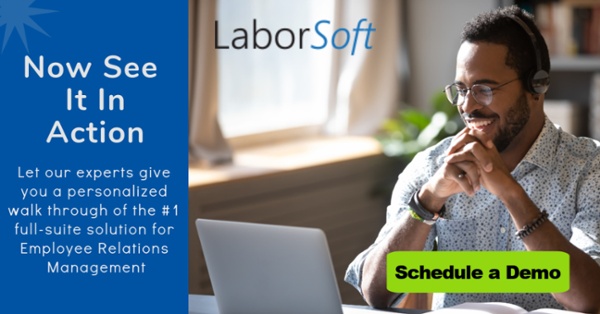How AI Is Transforming HR Case Management and Compliance
Read Time 4 mins | Nov 21, 2025 | Written by: LaborSoft

Compliance is in trouble. Research from HR.com has shown that organizations aren’t getting sufficient resources to key stakeholders — a non-negotiable element of maintaining compliance. Only 4 in 10 survey respondents believe their organization gives key stakeholders proper education and training. Even fewer, 3 in 10, say the same about tools and technologies.
The technology part, at least, is steadily getting easier.
The AI Revolution in HR
Artificial Intelligence (AI) is no longer a futuristic concept reserved for tech startups. Today, it’s become — as a growing number of professionals would posit — an essential tool for the modern HR leader. AI is transforming the way organizations approach the management of employee grievances, documentation processes, compliance with ever-changing labor laws, overall case management, and general fairness in policy and procedure enforcement.
HR departments have traditionally relied on manual processes like paper trails, spreadsheets, and time-intensive reviews. However, these can often lead to delays, inconsistencies, and human error. AI-powered systems are now helping HR teams shift toward a more data-driven, automated workflow that improves both accuracy and transparency.
Artificial intelligence has already redefined how HR handles investigations. A considered implementation can help organizations like yours move faster and build trust with employees and unions alike.
Improved Case Management Through Automations & Machine Learning
At its core, AI thrives on patterns, and HR case management is full of them. Each grievance, complaint, or arbitration leaves a trail of structured and unstructured data: issue type, department, timelines, and outcomes. Manual analysis of that data is time-consuming and error-prone. That’s the biggest area for gain with AI..
Platforms like LaborSoft offer convenient case management automations to help you categorize grievances in appropriate templates and track/detect recurring themes (such as repeated scheduling disputes, disciplinary inconsistencies, or department-level communication breakdowns). The insights in the system can help your team flag these as potential compliance risks or emerging workplace trends before they escalate into larger labor disputes.
Key benefits of a more intelligent approach to case management include:
- Automated case triage: AI of some new tools can classify new cases and route them to the appropriate investigator or compliance officer.
- Prioritization based on risk: AI-driven systems may highlight cases with higher potential for legal exposure or employee impact.
- Outcome prediction: AI can estimate likely resolution pathways based on historical data, helping HR allocate resources strategically.
- Efficiency gains: By reducing repetitive administrative work, HR professionals can focus more on strategic labor relations and employee engagement.
Organizations once reacted to problems after they occurred. Now, HR teams can proactively identify and resolve issues early. This is stronger for both compliance and culture.
Enhanced Compliance and Fairness
Compliance is the backbone of effective HR operations. Federal and state regulations around everything from wage and hour laws to family leave, age discrimination, and arbitration are constantly evolving, and just trying to keep up can overwhelm any HR department.
AI provides a safeguard against compliance lapses by monitoring data in a continuous way, quickly spotting anomalies, and making sure every case follows established policy and legal procedures. For example:
- Document integrity checks: You might use AI-powered HR tools to confirm that each case has required forms, notes, and approvals before closure.
- Consistency auditing: AI could flag when similar cases produce different disciplinary outcomes (then prompting HR to review for fairness).
- Policy alignment: AI could ensure each action taken complies with your internal HR manual, collective bargaining agreements, or federal labor standards.
In arbitration and grievance contexts, AI-driven analytics bring a new level of transparency. By examining past outcomes, HR can identify systemic issues — such as patterns in retaliation claims or repeat grievances by the same manager — and implement preventive measures.
Perhaps the most powerful use of embedded AI insights is when they’re worked directly into a compliance officer’s case management workflow. Each case remains audit-ready, with AI-generated reports showing how decisions were made, what data informed them, and whether they align with compliance standards. The resulting consistency, defensibility, and fairness hit all three pillars of trustworthy HR governance.
Predictive Insights for Proactive Prevention
The real power of AI may lie in its predictive potential. Workplace analytics have always helped HR understand what happened. Now, with AI, they can also reveal what might happen next.
For example, a system could detect early warning signs of employee dissatisfaction by analyzing grievance frequency or turnover trends. It could then identify departments with rising complaint volumes or declining resolution times — signals that warrant proactive engagement before morale or compliance erodes.
By spotting these patterns early, HR leaders can address root causes such as unclear policies, poor communication, or managerial inconsistencies and transform grievance management from reactive firefighting into strategic prevention.
Building a Future of Fairness and Trust
AI is redefining fairness in the workplace by bringing objectivity, consistency, and speed to HR decision-making. When combined with human judgment and empathy, it creates a balanced approach that fosters trust among employees and compliance confidence for organizations.
As AI continues to evolve, its role in HR will deepen — from automating compliance documentation to powering predictive analytics that anticipate disputes before they arise. LaborSoft is at the forefront of this transformation, equipping HR professionals with intelligent tools that make data-driven decisions easier, faster, and more defensible.


